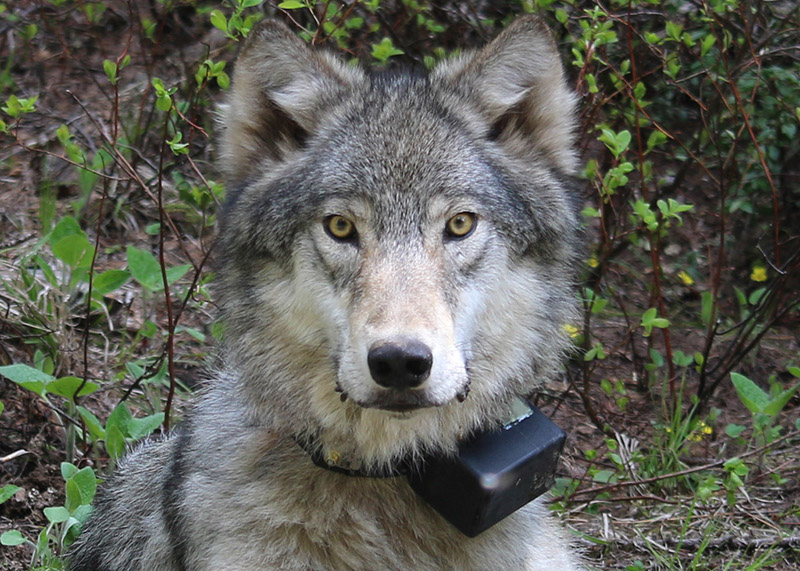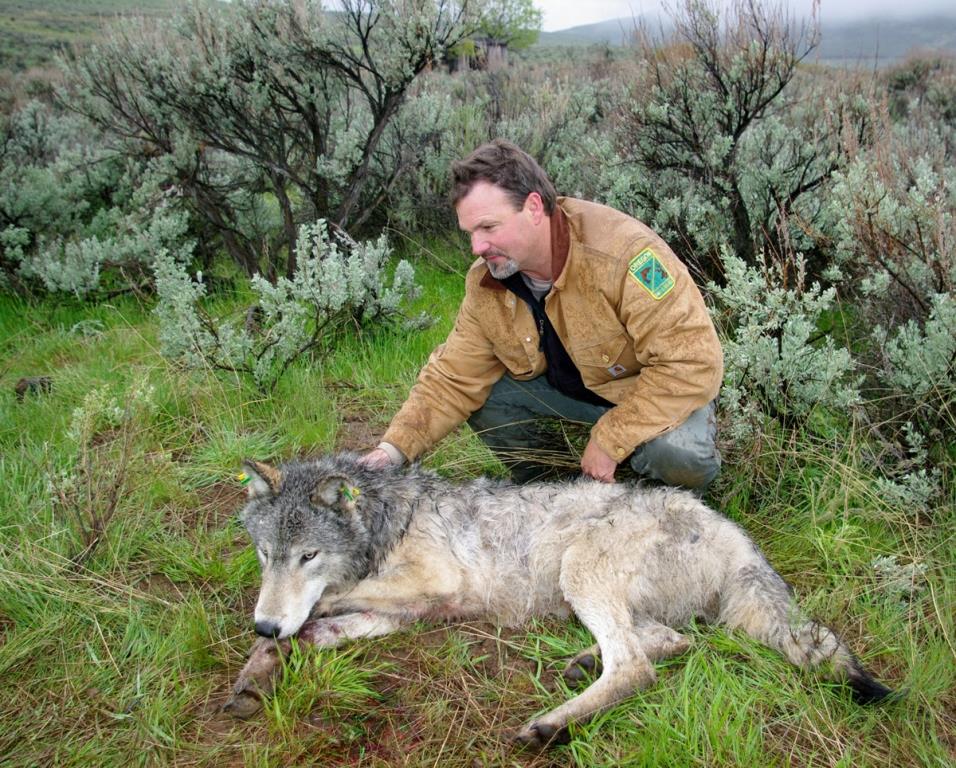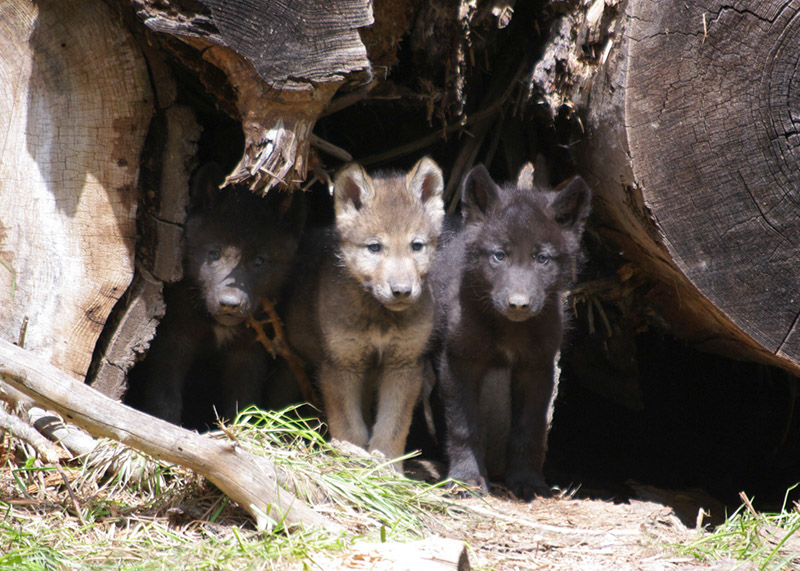On Friday, October 10th, the Oregon Department of Fish & Wildlife (ODFW) Commission will discuss three extremely consequential wolf issues. Below, please find important information and statements from Oregon Wild regarding this meeting and the Oregon Wolf Conservation and Management Plan. Meeting materials from the agency may be found at http://www.dfw.state.or.us/
Sharing Wolf Locations with the Public Representatives of the Oregon Cattlemen’s Association, including longtime anti-wolf livestock managers Todd Nash and Rod Childers, have requested that ODFW expand its program of using GPS collars and begin providing specific wolf location data to ranchers.
Representatives of the Oregon Cattlemen’s Association, including longtime anti-wolf livestock managers Todd Nash and Rod Childers, have requested that ODFW expand its program of using GPS collars and begin providing specific wolf location data to ranchers.
Currently, ODFW provides generalized location information in hopes of encouraging ranchers to take action to prevent conflict between livestock and wolves. To date, the program has not shared exact location data in real time in an effort to reduce the likelihood of the information being used to kill the endangered animals. Commission Chair Levy* instructed ODFW staff to consider the proposal which has since evoked strenuous objections of conservationists and wildlife professionals.
The existing program has been controversial. Location information has gone viral, been abused, and used by some who encourage poaching. Conservationists and professional wildlife managers strongly oppose sharing more specific information, as it may encourage illegal behavior, set troubling precedents, and harm recovery efforts. It could also undermine trust in ODFW by wildlife advocates, already suspicious of the agency’s past missteps on wolf conservation.
“We’ve always said that to the extent this program helps prevent conflict we support it. However, we strenuously oppose the idea of providing a roadmap to poachers by giving out specific location data, and it is deeply troubling to see the ODFW Commission even consider such a proposal.”
- Steve Pedery, Conservation Director, Oregon Wild
5-year review of the Oregon Wolf Conservation & Management Plan The current iteration of the Oregon Wolf Plan was codified just last summer. It was the result of exhaustive negotiations endorsed by the Commission, Governor Kitzhaber, the Oregon legislature, Oregon Cattlemen’s Association, and several conservation organizations. The agreement increased transparency, reduced ambiguity, increased trust in ODFW and provided more certainty for all stakeholders. It allows wolves to be killed by the state and ranchers, but only after non-lethal measures to prevent conflict have been tried. The plan is set to undergo a 5-year review by ODFW. Upon his recent retirement, ODFW Director Roy Elicker cited the settlement and resulting plan as the singular achievement of which he was most proud.
The current iteration of the Oregon Wolf Plan was codified just last summer. It was the result of exhaustive negotiations endorsed by the Commission, Governor Kitzhaber, the Oregon legislature, Oregon Cattlemen’s Association, and several conservation organizations. The agreement increased transparency, reduced ambiguity, increased trust in ODFW and provided more certainty for all stakeholders. It allows wolves to be killed by the state and ranchers, but only after non-lethal measures to prevent conflict have been tried. The plan is set to undergo a 5-year review by ODFW. Upon his recent retirement, ODFW Director Roy Elicker cited the settlement and resulting plan as the singular achievement of which he was most proud.
Oregon’s plan was written in 2005 after an exhaustive public process that included stakeholders from biologists and hunters to the conservation community and livestock industry. It was supported by nearly all parties, but opposed by the Oregon Cattlemen’s Association. Just two years after wolves returned to Oregon, the plan underwent its first 5-year review. Over 20,000 public comments were submitted with over 90% in favor of stronger protections. Despite the overwhelming public support, the plan was weakened. Those changes, coupled with ambiguity in the plan and ODFW’s authority to kill wolves, led to a legal conflict that was ultimately resolved in 2013.
Conservation interests have urged the state to maintain a cautious approach in its review of the recently adopted plan. While imperfect, Oregon’s plan seeks to balance legitimate concerns of the livestock industry, conservation values, and science against old prejudices that fuel a desire to simply kill wolves. Aggressive policies in Idaho, Wyoming, Washington, and the Southwest have demonstrated that killing wolves does not reduce conflict.
“Oregon’s Wolf Plan is far from perfect. It included significant compromises from all sides, and it has clearly helped reduce conflict. The five-year review should not be seen as an opportunity to throw away the hard won progress we have made in Oregon.”
- Rob Klavins, Northeast Oregon Field Coordinator, Oregon Wild
Reviewing wolf protections As part of the 2005 Wolf Plan compromise, responsible parties accepted a review of the wolf’s status when there had been 4-breeding pairs for three consecutive years. Barring unexpected increases in poaching, disease, or other mortality, that event will likely occur at the end of the calendar year. At that time, the state can move wolves in Eastern Oregon to Phase II of management and initiate a statewide status review.
As part of the 2005 Wolf Plan compromise, responsible parties accepted a review of the wolf’s status when there had been 4-breeding pairs for three consecutive years. Barring unexpected increases in poaching, disease, or other mortality, that event will likely occur at the end of the calendar year. At that time, the state can move wolves in Eastern Oregon to Phase II of management and initiate a statewide status review.
It is important to note that 4-breeding pairs in Eastern Oregon has never been an end point recovery threshold nor a trigger for removing basic Endangered Species protections for wolves. It allows the state to undergo a rigorous science-based, transparent public process for which there should be no predetermined outcome. (see page 27 of the Oregon Wolf Plan)
Oregon’s known wolf population stands at 64 known adults almost entirely restricted to the Northeast corner of the state. While not opposed to the review process, conservationists have expressed skepticism that the criteria for delisting can be met and concern that some have predetermined the outcome.
“Though moving in the right direction, few biologists would argue that 64 individuals constitutes a recovered population of any species. Wolf recovery is on the right track, but it’s far too early to declare ‘Mission Accomplished’ here in Oregon”.
- Quinn Read, Wildlife Coordinator, Oregon Wild
###
* A previous version of this piece identified ODFW Commission Chair Bobby Levy as having recently been listed as representing the Oregon Sheepgrowers Association at an Oregon Senate Committee hearing on wolves. No representative appeared and various versions of the agenda list various names including "Boby Levy". At a recent Commission hearing on wolves, Chair Levy recused herself based on her interests in the livestock industry. However it appears the representative at the Senate hearing may have been her husband Bob Levy - an entirely different individual. If the original citation was in error, we regret misidentifying Chair Levy but applaud her for recusing herself.

